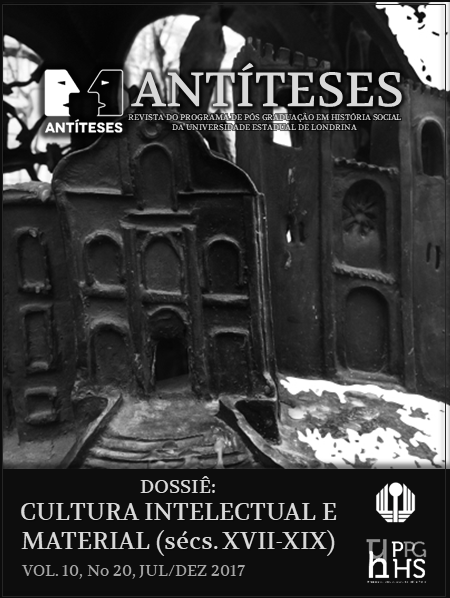“The Most High does not dwell in houses made with human hands”: a study of possible hellenistic jewish parallels for the Jerusalem temple as idolatry in acts 7:48
DOI:
https://doi.org/10.5433/1984-3356.2017v10n20p1063Palabras clave:
Hellenistic Judaism, Acts of the Apostles, Jerusalem temple, Stephen, IdolatryResumen
The purpose of the present article is twofold. (1) It analyzes Stephen’s speech, a controversial New Testament passage in the book of Acts chapter 7. In it, Stephen, a Hellenist Christian Jew, criticizes the Jerusalem temple arguing that “the Most High does not dwell in houses made with human hands (cheiropoietois)” (Acts 7:48). Calling the temple a cheiropoietos was considered blasphemy once prior to the New Testament that term was only used for idols/false gods in the Hebrew Bible. (2) As Stephen’s speech seems to recover historical material, the article, then, examines Hellenistic Jewish texts written around 1st century BCE and 1st century CE which present negative references to the Jerusalem Temple in order to reconstruct a plausible Hellenistic Jewish background for Acts 7:48.Descargas
Citas
BARCLAY, John M. G. Jews in the Mediterranean Diaspora. From Alexander to Trajan (323 BCE117 CE). Edinburgh: T&T Clark, 1996.
BARKER, Margaret. Temple Imagery in Philo: An Indication of the Origin of the Logos?, in: HORBURY, W. (ed.) JSNT Supplement Series 48: Templum Amicitiae. Essays on the Second Temple presented to Ernst Bammel. Sheffield: Sheffield Academic Press, 1991, pp. 70-102.
BARRETT, Charles K. Attitudes to the Temple in the Acts of the Apostles, in: HORBURY, W. (ed.) JSNT Supplement Series 48: Templum Amicitiae. Essays on the Second Temple presented to Ernst Bammel. Sheffield: Sheffield Academic Press, 1991, pp. 345-367.
BARRETT, Charles K. The International Critical Commentary: Acts of the Apostles. Edinburgh: T & T Clark, 1994, vol. 1.
COLLINS, John J. The Sibylline Oracles of Egyptian Judaism. Missoula: Society of Biblical Literature for the Pseudepigrapha Group, 1972.
COLLINS, John J. The Place of the Fourth Sibyl in the Development of the Jewish Sibyllina, Journal of Jewish Studies 25 (1974), pp. 365-80.
COLLINS, John J. Sibylline Oracles, in: CHARLESWORTH, J. T. The Old Testament Pseudepigrapha, 1: Apocalyptic Literature & Testaments. Garden City, NY: Doubleday, 1983, pp. 362-531.
COLLINS, John J. Jewish Wisdom in the Hellenistic Age. Edinburgh: T&T Clark, 1997.
EPISTLES of Pseudo-Heraclitus, in: ATTRIDGE, H. W. First-Century Cynicism in the Epistles of Heraclitus. Missoula: Scholars Press (Harvard Theological Review), 1976.
FITZMYER, Joseph. The Anchor Bible: The Acts of the Apostles. A New Translation with Introduction and Commentary. New York: Doubleday, 1998.
HENGEL, Martin. Judaism and Hellenism: Studies in their encounter in Palestine during the early Hellenistic period. Philadelphia: Fortress Press, 2 vols, 1974.
GÄRTNER, Bertil. The Temple and the Community in Qumran and the New Testament. A Comparative study in the Temple symbolism of the Qumran texts and the New Testament. Cambridge: Cambridge University Press, 1965.
GAVENTA, Beverly R. Toward a Theology of Acts: Reading and Rereading, Interpretation 42(1988), pp. 146-57.
GRUEN, Erich S. Heritage and Hellenism: the reinvention of Jewish tradition. Berkeley: University of California Press, 1998.
HADAS-LEBEL, Mireille (Ed.) Philo of Alexandria: A Thinker in the Jewish Diaspora. Leiden: Brill, 2012.
MEEKS, Wayne A. (gen. ed.) The HarperCollins Study Bible: New Revised Standard Version, with the Apocraphal / Deuterocanonical books. San Francisco: HarperSanFrancisco, c1993.
NESTLE-ALAND. Novum Testamentum Graece. Stuttgart: Deutsche Bibelgesellschaft, 1993.
NIKIPROWETZKY, Valentin. La Troisième Sibylle. Paris: La Haye, 1970.
PHILO OF ALEXANDRIA, in: Loeb Classical Library, with an English translation by F. H. Colson and G. H. Whitaker. London, Heinemann; New York, Putnam, 1929-1962.
SANDELIN, Karl-Gustav. Review of P.V. Legarth, Guds Tempel. Tempelsymbolisme og kristologi hos Ignatius af Antiokia. In: RUNIA, David T. Philo of Alexandria: an annotated bibliography, 1987-1996: with addenda for 1937-1986; with the assistance of H.M. Keizer and in collaboration with the International Philo Bibliography Project. Leiden: Brill, 2000, p. 167.
SELVATICI, Monica. Os Judeus Helenistas e a Primeira Expansão Cristã. Questões de Narrativa, Visibilidade Histórica e Etnicidade no Livro de Atos dos Apóstolos. (Ph.D. Dissertation in History). Campinas, UNICAMP, 2006.
SIBYLLINE Oracles Books III, IV and V, in: CHARLESWORTH, J. T. The Old Testament Pseudepigrapha, 1: Apocalyptic Literature & Testaments. Garden City, NY: Doubleday, 1983, pp. 362-531.
SMITH, Steve. The Fate of the Jerusalem Temple in Luke-Acts: An Intertextual Approach to Jesus’ Laments Over Jerusalem and Stephen’s Speech. London & New York: Bloomsbury T&T Clark, 2017.
SWEET, J. P. M. A House Not Made With Hands, in: HORBURY, W. JSNT Supplement Series 48: Templum Amicitiae. Essays on the Second Temple presented to Ernst Bammel. Sheffield: Sheffield Academic Press, 1991, pp. 368-90.
YARBRO COLLINS, Adela. Jesus’ Action in Herod’s Temple”, in: YARBRO COLLINS, A.; MITCHELL, M. M. (eds.) Antiquity and Humanity. Essays on Ancient Religion and Philosophy Presented to Hans Dieter Betz on his 70th Birthday. Mohr Siebeck, 2001, pp. 45-61.
Descargas
Publicado
Cómo citar
Número
Sección
Licencia
A Revista Antíteses adota a Licença Creative Commons Attribution 4.0 International, portanto, os direitos autorais relativos aos artigos publicados são do(s) autor (es), que cedem à Revista Antíteses o direito de exclusividade de primeira publicação.
Sob essa licença é possível: Compartilhar - copiar e redistribuir o material em qualquer suporte ou formato. Adaptar - remixar, transformar, e criar a partir do material, atribuindo o devido crédito.
https://creativecommons.org/licenses/by/4.0/











